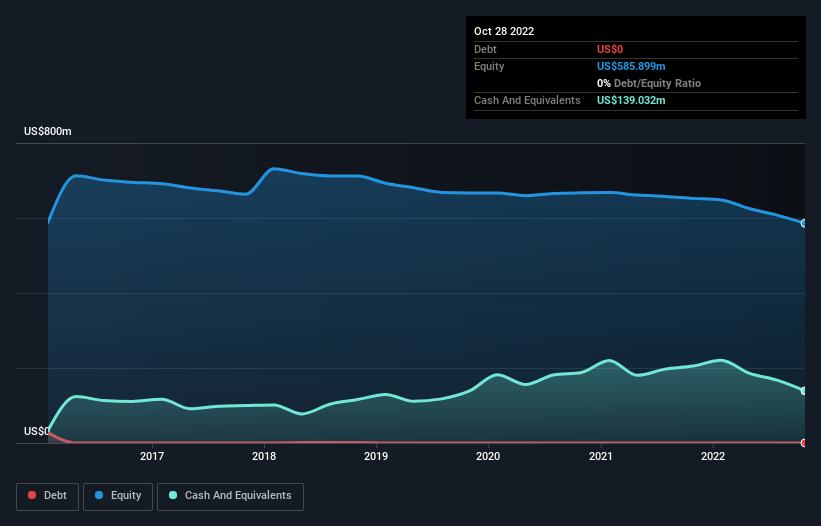- United States
- /
- Software
- /
- NasdaqGS:SCWX
Companies Like SecureWorks (NASDAQ:SCWX) Are In A Position To Invest In Growth
Just because a business does not make any money, does not mean that the stock will go down. For example, biotech and mining exploration companies often lose money for years before finding success with a new treatment or mineral discovery. Having said that, unprofitable companies are risky because they could potentially burn through all their cash and become distressed.
So, the natural question for SecureWorks (NASDAQ:SCWX) shareholders is whether they should be concerned by its rate of cash burn. In this article, we define cash burn as its annual (negative) free cash flow, which is the amount of money a company spends each year to fund its growth. Let's start with an examination of the business' cash, relative to its cash burn.
View our latest analysis for SecureWorks
Does SecureWorks Have A Long Cash Runway?
A company's cash runway is the amount of time it would take to burn through its cash reserves at its current cash burn rate. As at October 2022, SecureWorks had cash of US$139m and no debt. Looking at the last year, the company burnt through US$57m. Therefore, from October 2022 it had 2.4 years of cash runway. That's decent, giving the company a couple years to develop its business. You can see how its cash balance has changed over time in the image below.

Is SecureWorks' Revenue Growing?
Given that SecureWorks actually had positive free cash flow last year, before burning cash this year, we'll focus on its operating revenue to get a measure of the business trajectory. Unfortunately, the last year has been a disappointment, with operating revenue dropping 13% during the period. While the past is always worth studying, it is the future that matters most of all. So you might want to take a peek at how much the company is expected to grow in the next few years.
Can SecureWorks Raise More Cash Easily?
Given its problematic fall in revenue, SecureWorks shareholders should consider how the company could fund its growth, if it turns out it needs more cash. Companies can raise capital through either debt or equity. Commonly, a business will sell new shares in itself to raise cash and drive growth. By comparing a company's annual cash burn to its total market capitalisation, we can estimate roughly how many shares it would have to issue in order to run the company for another year (at the same burn rate).
SecureWorks' cash burn of US$57m is about 11% of its US$502m market capitalisation. As a result, we'd venture that the company could raise more cash for growth without much trouble, albeit at the cost of some dilution.
How Risky Is SecureWorks' Cash Burn Situation?
On this analysis of SecureWorks' cash burn, we think its cash runway was reassuring, while its falling revenue has us a bit worried. Based on the factors mentioned in this article, we think its cash burn situation warrants some attention from shareholders, but we don't think they should be worried. Taking a deeper dive, we've spotted 2 warning signs for SecureWorks you should be aware of, and 1 of them is significant.
Of course SecureWorks may not be the best stock to buy. So you may wish to see this free collection of companies boasting high return on equity, or this list of stocks that insiders are buying.
New: Manage All Your Stock Portfolios in One Place
We've created the ultimate portfolio companion for stock investors, and it's free.
• Connect an unlimited number of Portfolios and see your total in one currency
• Be alerted to new Warning Signs or Risks via email or mobile
• Track the Fair Value of your stocks
Have feedback on this article? Concerned about the content? Get in touch with us directly. Alternatively, email editorial-team (at) simplywallst.com.
This article by Simply Wall St is general in nature. We provide commentary based on historical data and analyst forecasts only using an unbiased methodology and our articles are not intended to be financial advice. It does not constitute a recommendation to buy or sell any stock, and does not take account of your objectives, or your financial situation. We aim to bring you long-term focused analysis driven by fundamental data. Note that our analysis may not factor in the latest price-sensitive company announcements or qualitative material. Simply Wall St has no position in any stocks mentioned.
About NasdaqGS:SCWX
SecureWorks
Through its subsidiaries, provides technology-driven information security solutions for protecting its customers in the United States and internationally.
Excellent balance sheet and fair value.
Similar Companies
Market Insights
Community Narratives



